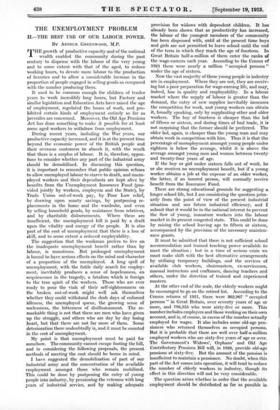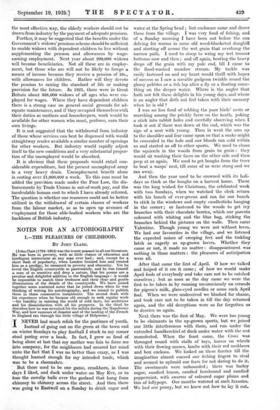THE UNEMPLOYMENT PROBLEM
THE growth of productive capacity and of the national wealth enabled the community during the past century to dispense with the labour of the very young and to some extent with that of the aged, to reduce working hours, to devote more labour to the production of luxuries and to allow a considerable increase in the proportion of people engaged in selling goods as compared with the number producing them.
It used to be common enough for children of tender years to work incredibly long hours, but Factory and similar legislation and Education Acts have raised the age of employment, regulated the hours of work, and pro- hibited certain kinds of employment entirely so far as juveniles are concerned. Moreover, the Old Age Pensions Act has done something to make it possible for at least some aged workers to withdraw from employment.
During recent years, including the War years, our productive capacity increased, and it is at the present time beyond the economic power of the British people and their overseas customers to absorb it, with the result that there is a surplus of labour. It is, therefore, oppor- tune to consider whether any part of the industrial army should be demobilized. In discussing this question, it is important to remember that public opinion refuses to allow unemployed labour to starve to death, and unem- ployed workers and their dependants are kept alive by benefits from the Unemployment Insurance Fund (pro- vided jointly by workers, employers and the State), by Trade Union out-of-work pay, by Poor Law relief, by drawing upon scanty savings, by postponing re- placements in the home and the wardrobe, and even by selling household goods, by assistance from relatives, and by charitable disbursements. Where these are insufficient, the unemployment bill is paid by a draft upon the vitality and energy of the people. It is also part of the cost of unemployment that there is a loss of skill, and to some extent a reduced employability.
The suggestion that the workman prefers to live on the inadequate unemployment benefit rather than by labour, is monstrous. But prolonged unemployment is bound to have serious effects on the mind and character of a proportion of the unemployed. A long spell of unemployment, with the futile daily search for employ- ment, inevitably produces a sense of hopelessness, an acquiescence in the tragedy, a fatalism which is foreign to the true spirit of the workers. Those who are ever ready to pour the vials of their self-righteousness on the broken out-of-work might well ask themselves ,whether they could withstand the drab days of enforced idleness, the unemployed queue, the growing sense of uselessness, the bitterness of disillusionment. The re- markable thing is not that there are men who have given up the struggle, and others who are day by day losing heart, but that there are not far more of them. Some ,deterioration there undoubtedly is, and it must be counted in the cost of unemployment.
My point is that unemployment must be paid for somehow. The community cannot escape footing the bill, and in considering the following proposals, the present methods of meeting the cost should be borne in mind. I have suggested the demobilization of part of our industrial army and the concentration of the available employment amongst those who remain mobilized. This could be done by postponing the entry of young people into industry, by pensioning the veterans with long years of industrial service, and by making adequate provision for widows with dependent children. It has already been shown that as productivity has increased, the labour of the youngest members of the community has been dispensed with, until at the present time boys, and girls are not permitted to leave school until the end of the term in which they reach the age of fourteen. In Great Britain half-a-million of them enter the ranks of the wage-earners each year. According to the Census of 1921 there were nearly a million " occupied persons " under the age of sixteen.
Now the vast majority of these young people in industry are in employment. Where they are not, they are receiv- ing but a poor preparation for wage-earning life, and may, indeed, lose in quality and employability. In a labour market where the supply of labour is greater than the demand, the entry of new supplies inevitably increases the competition for work, and young workers can obtain it, broadly speaking, only by supplanting other and older workers. The boy of fourteen is cheaper than the lad of fifteen or sixteen, and during times of bad trade, it is not surprising that the former should be preferred. The older lad, again, is cheaper than the young man and may obtain work in competition with him. Thus it is that the percentage of unemployment amongst young people under eighteen is below the average, whilst it is above the average amongst young men and women between twenty and twenty-four years of age.
If the boy or girl under sixteen falls out of work, he or she receives no unemployment benefit, but if a young worker obtains a job at the expense of an older worker, the latter, if an insured person, will normally receive benefit from the Insurance Fund.
There are strong educational grounds for suggesting a, longer school life, but I am considering the question prim- arily from the point of view of the present industrial situation and our future industrial efficiency, and I submit that it would be in the national interest to prevent the flow of young, immature workers into the labour market in its present congested state. This could be done by raising the school leaving age to fifteen or sixteen, accompanied by the provision of the necessary mainten- ance grants.
It must be admitted that there is not sufficient school' accommodation and trained teaching power available to meet the situation ; but in a time of serious crisis we must make shift with the best alternative arrangements by utilizing temporary buildings, and the services of available club workers, choirurasters, ex-servicemen, manual instructors and craftsmen, dancing teachers and others, under the direction of trained and experienced masters.
At the other end of the scale, the elderly workers might be encouraged to go on the retired list. According to the Census returns of 1921, there were 302,967 " occupied persons " in Great Britain, over seventy years of age or more, and 798,555 who were sixty-five or more. This numberincludes employers and those working on their own account, and is, of course, in excess of the number actually employed for wages. It also includes some old-age pen- sioners who returned themselves as occupied persons. But it is probable that there are well over half-a-million employed workers who are sixty-five years of age or over. The Government's Widows', Orphans' and Old Age Contributory Pensions Bill will, in 1928, provide old-age pensions at sixty-five. But the amount of the pension is insufficient to maintain a pensioner. No doubt, when this part of the Act comes into operation, it will tend to reduce the number of elderly workers in industry, though its effect in this direction will not be very considerable.
The question arises whether in order that the available employment should be distributed as far as possible in. the most effective way, the elderly workers should not be drawn from industry by the payment of adequate pensions.
Further, it may be suggested that the benefits under the Government's widows' pensions scheme should be sufficient to enable widows with dependent children to live without supplementing the pension and allowances by wage- earning employment. Next year about 200,000 widows will become beneficiaries. Not all these are in employ- ment, but those who are will not be likely to forego a means of income because they receive a pension of 10s., with allowances for children. Rather will they devote the pension to raising the standard of life or making provision for the future. In 1921, there were in Great Britain about 338,000 widows of all ages who were em- ployed for wages. Where they have dependent children there is a strong case on general social grounds for ad- equate maintenance, and if they occupied themselves with their duties as mothers and housekeepers, work would be available for other women who must, perforce, earn their own livings.
It is not suggested that the withdrawal from industry of those whose services can best be dispensed with would straightway render available a similar number of openings for other workers. But industry would rapidly adjust itself to the new conditions and a very substantial propor- tion of the unemployed would be absorbed.
It is obvious that these proposals would entail con- siderable expenditure, but the present unemployed army is a very heavy drain. Unemployment benefit alone is costing over £1,000,000 a week. To this sum must be added the provision made under the Poor Law, the dis- bursements by Trade Unions in out-of-work pay, and the incalculable human cost to which I have already referred. The question is whether our resources could not be better utilized in the withdrawal of certain classes of workers from the labour market, so as to open up avenues of employment for those able-bodied workers who are the backbone of British industry.











































 Previous page
Previous page